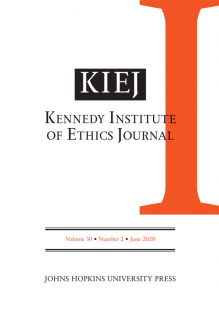
Johns Hopkins UniversityEst. 1876
America’s First Research University
What Makes Health Care Special?

What makes health care special? That’s the question driving an essay by Chad Horne in a recent issue of the Kennedy Institute of Ethics Journal. Horne, currently a Visiting Assistant Professor of Philosophy at Franklin & Marshall College in Lancaster, PA, joined us for a Q&A about his essay.
What is the difficulty of coming to a conclusion on why health care costs should get special treatment?

, what I have in mind is just the fact that citizens in most wealthy countries pay very little of their own health care costs out of pocket. Instead, either the government or a very heavily regulated private insurer foots most of the bill. Now of course there are lots of important goods, like food or housing, where the state steps in to provide targeted benefits for the disadvantaged, and that’s very important. But what makes health care unique is that health care programs typically cover all citizens, rich or poor (the U.S. being something of an outlier in this respect). Health care is typically universal program, and people like it that way. The question is, why?
Philosophers are generally inclined to think that this special treatment must have something to do with the great moral value of health. That’s where the difficulty comes in. Because while of course health is valuable for all kinds of reasons, it isn’t uniquely valuable. Whatever it is that’s supposed to be so valuable about health, there’s going to be other goods that are valuable for those very same reasons and to the very same extent. And then it seems like consistency is going to force you to say that those goods should be treated as special, too, which doesn’t seem right – at least not in most cases. Nutrition is important for many of the same reasons that health care is, for instance, but most people don’t think those programs should be universal – rich people can buy their own food.
How important is it to frame the unpredictability of health care costs at the forefront of this discussion?
I think it’s very important. The unpredictability of health care costs is what accounts for the difference between health care and other important goods; it’s why health care ought to be universally provided, while assistance targeted to those in need is more appropriate for things like food and shelter. Unpredictability matters in two big ways. For one thing, people just don’t know with any real certainty what their health care costs are going to be going forward, which is why they want health care insurance. But for another, uncertainty also creates problems in the pricing of health care insurance, mainly in the form of what’s called adverse selection. Roughly, adverse selection just refers to the fact that the people who are most prone to buy insurance are exactly the people who are most likely to use it. This is why private markets in health insurance are usually a mess, and it’s why even countries that rely heavily on private insurers typically have some sort of mandate for citizens to purchase insurance.
What makes looking at health care costs in terms of uncertainty different from other points of view?
I think it makes a more compelling defense of universal health care programs possible. It enables us to see how sticking together in the face of uncertainty can be mutually advantageous – it can make all of us better off. By spreading risk around, everyone can plan for the future more effectively. I think that’s a more persuasive argument for universal health care than arguments that focus exclusively on the importance of helping the less fortunate. That’s particularly true if you think about what might actually convince someone who isn’t already on board with the project of universal health care.
Why is it so critical to keep having these discussions from so many different angles?
One reason it’s critical is because it can help us see things we might have missed before. My article builds a lot on the work of health economists and policy thinkers, and for that reason, I think it brings some things to the philosophical discussion that might have been missing before. For example, the failures of private health insurance markets play a big role in policy discussions, but philosophers have had very little to say about that. By looking at the ways other disciplines talk about these issues, we can hopefully start to get a more complete picture.
Why is the Kennedy Institute of Ethics Journal the right venue for this paper?
I thought the Kennedy Institute of Ethics Journal would be a good place for this paper because of its commitment to publishing empirically informed, interdisciplinary research in ethics. I think the journal is publishing some of the best work in bioethics right now, and I’m very proud to be a part of it.


